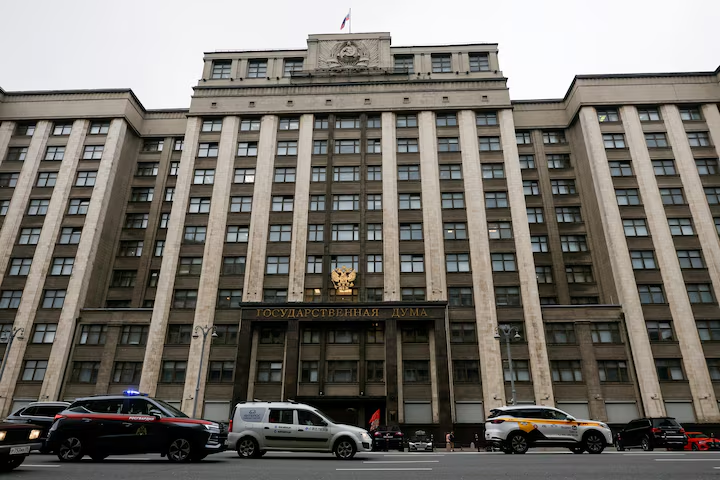The latest escalation in Europe’s sanctions battle took centre stage as Russia warns Belgium and Euroclear that any attempt by the European Union to seize frozen Russian assets will face immediate retaliation. Moscow’s message came through a strong resolution passed in the State Duma, marking the clearest warning yet against the EU’s plan to repurpose Russian funds for Ukraine.
EU Considers Using €140 Billion in Frozen Assets for Ukraine
The EU is preparing a major financial package to support Ukraine’s reconstruction and defence needs. Brussels aims to raise a €140 billion loan backed by profits derived from Russian assets immobilised in European financial institutions since 2022.
Most of these funds are held at Euroclear, the Brussels-based securities clearing giant. As plans advance, EU officials argue that directing income from these assets toward Ukraine does not violate international law. However, Moscow rejects that argument outright.
The idea of seizing—not just using profits from—parts of Russia’s state assets has gained traction among EU members, pushing tensions with Moscow to new levels.
Moscow Issues Its Strongest Warning Yet
In response, the Duma passed a formal resolution outlining how Russia intends to hit back if Brussels seizes any portion of its frozen holdings. The statement stressed that Russia warns Belgium and Euroclear that their entities will face legal, financial, and diplomatic consequences.
Legal Action Against Belgium
Russian lawmakers said Belgium, home of Euroclear, could become the direct target of lawsuits and retaliatory measures. They argue that Belgium would bear responsibility for any seizure since its courts and government have jurisdiction over Euroclear.
Counter-Seizures Inside Russia
The Duma also proposed taking control of assets owned by investors from so-called “unfriendly states.” These include EU member countries, the United States, the United Kingdom, and others that support sanctions against Moscow.
If enacted, this could affect billions of dollars in corporate holdings, property, and joint-venture investments inside Russia.
Direct Pressure on Euroclear
Euroclear itself faces possible restrictions, penalties, or operational limits inside Russia. Lawmakers accused the company of being “complicit” in what they describe as a Western attempt to weaponise financial institutions against a sovereign state.
Why Euroclear Is at the Centre of the Dispute
Euroclear holds the largest share of Russia’s frozen sovereign assets—estimated at more than €190 billion. These include Russian central bank reserves that were blocked in the aftermath of Moscow’s invasion of Ukraine in February 2022.
EU leaders believe the scale of these holdings makes Euroclear a primary vehicle for financing Ukraine. Russia, however, sees the proposal as outright theft.
Because Russia warns Belgium and Euroclear directly, the stakes for Brussels-based institutions are high. Euroclear has already reported multibillion-euro profits generated from interest on frozen assets, adding to political pressure in Europe to repurpose this money.
Retaliation Could Expand Beyond Finance
Russian lawmakers hinted that retaliation will not be limited to asset seizures. Other possible measures include:
- Restricting trade with Belgium
- Targeting European companies operating in Russia
- Expelling or limiting Western investment groups
- Expanding the list of “unfriendly” states
Such steps would escalate the economic confrontation between Russia and Europe, with long-term consequences for investors.
European Reaction and Global Implications
EU Officials Downplay Russia’s Threats
EU policymakers publicly insist that Russia cannot dictate how Europe handles frozen assets within its jurisdiction. Some member states support going even further by confiscating the principal amount—not just the profits. Others worry about legal risks and potential blowback in global financial markets.
Investors Fear Precedent Setting
Financial experts warn that the confrontation could set a precedent affecting how sovereign reserves are treated during geopolitical conflicts. If a major clearing house like Euroclear becomes entangled in asset seizures, global confidence in Western financial systems could be tested.
Ukraine Welcomes the Plan
Kyiv has repeatedly urged allies to use frozen Russian funds to support Ukraine’s defence and post-war rebuilding. The money represents one of the largest potential financing sources for the Ukrainian government.
A New Phase in the Economic War
The confrontation marks a turning point in the broader economic struggle between Russia and the West. As Russia warns Belgium and Euroclear, Moscow signals that it will respond aggressively to any attempt to seize what it calls sovereign property.
The EU, meanwhile, faces mounting pressure to secure sustainable funding for Ukraine. Both sides now stand on the edge of a deeper financial conflict—one that could reshape global investment norms and intensify geopolitical divisions.

